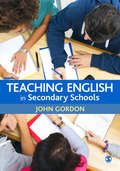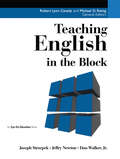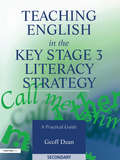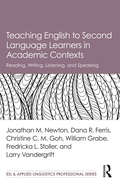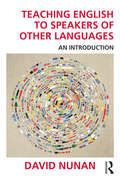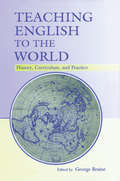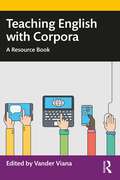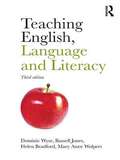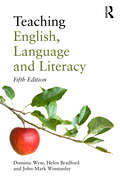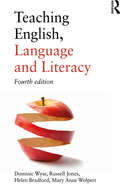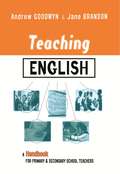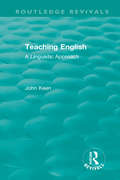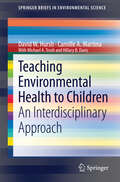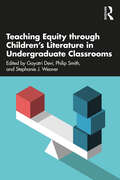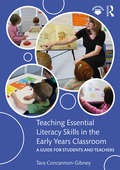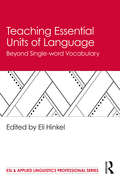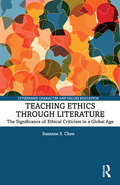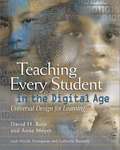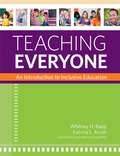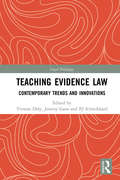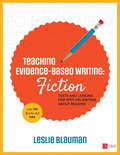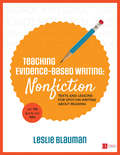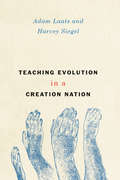- Table View
- List View
Teaching English in Secondary Schools
by John GordonThis book is an indispensable guide for anyone training to become a secondary English teacher. It provides an overview of the main topics taught in schools, informed by good teaching practice drawn from the classroom and supported by research and theory, and engages with the requirements of the 2014 National Curriculum for England. Each chapter is based around a ‘lesson feedback’ case study informed by real classroom observations combined with research findings to explore and analyse what underpins high quality English teaching. Coverage includes: · Encouraging a love of reading in your classroom · How to teach effective writing for pleasure and for information · Developing students’ grammar, vocabulary and spoken English · Inspiring teaching using drama, poetry and Shakespeare · Intelligent use of media and new literacies in teaching This is essential reading on all secondary English initial teacher education courses, including school-based (SCITT, School Direct, Teach First), university-based (PGCE) and employment-based routes into teaching.
Teaching English in the Block (Teaching In The Block Ser.)
by Dan Walker, Jr Jeff Newton Joe StrzepkProvides detailed instructional strategies, sample lesson plans, and sample assessments which can be adapted in your classroom to help create better readers and more effective writers.
Teaching English in the Key Stage 3 Literacy Strategy
by Geoff DeanThis book will supplement the training currently being offered to all secondary English departments. It offers a view of the place of the English 'strand' in the overall Key Stage 3 strategy and gives support to English departments in their preparations for a new way of working. It will encourage English teachers to review their current schemes of work, offering suggestions for more substantial teaching and learning modules, as well as practical ideas for classroom use and recommended resources. The book interprets and explains the NLS document for busy practitioners; reinforces the messages of the National Literacy Strategy (NLS); spells out the expectations of the framework and offer guidance on how to fulfil them; and describes and explains the types of teaching methods to improve students' learning. This book includes many practical ideas for classroom activities and offers direct support for the less confident English teacher. The book is equally valuable to students and practicing teachers.
Teaching English to Second Language Learners in Academic Contexts: Reading, Writing, Listening, and Speaking (ESL & Applied Linguistics Professional Series)
by William Grabe Dana R. Ferris Fredricka L. Stoller Larry Vandergrift Jonathan M. Newton Christine C.M. GohTeaching English to Second Language Learners in Academic Contexts: Reading, Writing, Listening, and Speaking provides the fundamental knowledge that ESL and EFL teachers need to teach the four language skills. This foundational text, written by internationally renowned experts in the field, explains why skills-based teaching is at the heart of effective instruction in English for academic purposes (EAP) contexts. Each of the four main sections of the book helps readers understand how each skill—reading, writing, listening, and speaking—works and explains what research has to say about successful skill performance. Pedagogically focused chapters apply this information to principles for EAP curriculum design and to instructional activities and tasks adaptable in a wide range of language-learning contexts. Options for assessment and the role of digital technologies are considered for each skill, and essential information on integrated-skill instruction is provided. Moving from theory to practice, this teacher-friendly text is an essential resource for courses in TESOL programs, for in-service teacher-training seminars, and for practicing EAP teachers who want to upgrade their teaching abilities and knowledge bases.
Teaching English to Speakers of Other Languages: An Introduction
by David NunanDavid Nunan's dynamic learner-centered teaching style has informed and inspired countless TESOL educators around the world. In this fresh, straightforward introduction to teaching English to speakers of other languages he presents teaching techniques and procedures along with the underlying theory and principles. Complex theories and research studies are explained in a clear and comprehensible, yet non-trivial, manner without trivializing them. Practical examples of how to develop teaching materials and tasks from sound principles provide rich illustrations of theoretical constructs. The content is presented through a lively variety of different textual genres including classroom vignettes showing language teaching in action, question and answer sessions, and opportunities to 'eavesdrop' on small group discussions among teachers and teachers in preparation. Readers get involved through engaging, interactive pedagogical features and opportunities for reflection and personal application. Each chapter follows the same format so that readers know what to expect as they work through the text. Key terms are defined in a Glossary at the end of the book. David Nunan's own reflections and commentaries throughout enrich the direct, up-close style of the text.
Teaching English to the World: History, Curriculum, and Practice
by George BraineTeaching English to the World: History, Curriculum, and Practice is a unique collection of English language teaching (ELT) histories, curricula, and personal narratives from non-native speaker (NNS) English teachers around the world. No other book brings such a range of international ELT professionals together to describe and narrate what they know best.The book includes chapters from Brazil, China, Germany, Hong Kong, Hungary, India, Indonesia, Israel, Japan, Lebanon, Poland, Saudi Arabia, Singapore, Sri Lanka, and Turkey. All chapters follow a consistent pattern, describing first the history of English language teaching in a particular country, then the current ELT curriculum, followed by the biography or the autobiography of an English teacher of that country. This consistency in the structuring of chapters will enable readers to assimilate the information easily while also comparing and contrasting the context of ELT in each country.The chapter authors--all born in or residents of the countries they represent and speakers of the local language or languages as well as English--provide insider perspectives on the challenges faced by local English language teachers. There is clear evidence that the majority of English teachers worldwide are nonnative speakers (NNS), and there is no doubt that many among them have been taught by indigenous teachers who themselves are nonnative speakers. This book brings the professional knowledge and experience of these teachers and the countries they represent to a mainstream Western audience including faculty, professionals, and graduate students in the field of ESL; to the international TESOL community; and to ELT teachers around the world.
Teaching English with Corpora: A Resource Book
by Vander VianaTeaching English with Corpora is an accessible and practical introduction to the ways in which online and offline corpora can be used in English language teaching (ELT). Featuring 70 chapters written by an international range of researchers and practitioners, this book: • provides readers with clear, tested examples of corpus-based/driven lesson plans; • contains activities relevant to English for general purposes and English for specific purposes; • caters for the needs of English language teachers working with learners at different proficiency levels; • features flexible teaching suggestions that can be explored as part of a lesson or as a full lesson. This book is an essential purchase for pre- and in-service English language teachers as well as those studying corpus linguistics in undergraduate/Master’s courses in applied linguistics, ELT and Teaching English to Speakers of Other Languages (TESOL).
Teaching English, Language and Literacy
by Dominic Wyse Russell Jones Helen Bradford Mary Anne Wolpert'This book is comprehensive, up-to-date, critical and authoritative. It is also, above all, well written. It will undoubtedly become standard reading for the next generation of teachers in training and practising teachers will also learn a great deal from dipping into its contents.' - David Wray, Professor of Literacy Education, University of Warwick '[A] well organised and comprehensive guide to the teaching of English and the teaching of language' Margaret Mallett - Emeritus Fellow of The English Association Are you looking for one book that covers every aspect of the teaching of English at primary level? Now fully updated, this third edition of Teaching English, Language and Literacy includes brand new chapters on children's literature and reading comprehension. Rooted in research evidence and multidisciplinary theory, this book is an essential introduction for anyone learning to teach English from the early years to primary school level. The authors draw on their research, scholarship and practice to offer advice on: developing reading, including choosing texts, and phonics teaching improving writing, including grammar and punctuation language and speaking and listening planning and assessing working effectively with multilingual pupils understanding historical developments in the subject the latest thinking in educational policy and practice the use of multimedia maintaining good home-school links gender and the teaching of English language and literacy All the chapters include clear examples of practice, coverage of key issues, analysis of research, and reflections on national policy to encourage the best possible response to the demands of national curricula. Each chapter also has a glossary to explain terms and gives suggestions for further reading. This book is for all who want to improve teaching English, language and literacy. Designed to help inform the practice of students on teacher training courses, but also of great use to those teachers wanting to keep pace with the latest developments in their specialist subject, this book covers the theory and practice of teaching English, language and literacy.
Teaching English, Language and Literacy
by Dominic Wyse Helen Bradford John-Mark WinstanleyAre you looking for one book that gives a comprehensive account of primary/elementary and early years English, language and literacy teaching? Based on robust research evidence and practical examples of effective teaching, this essential textbook critically evaluates curriculum policies and provides guidance for teachers on implementation of evidence-based teaching in classrooms. This fully revised fifth edition has a brand new chapter on Reading for Pleasure, and has substantially rewritten chapters to reflect recent developments in research, evaluations of new policy directions, and new practical examples of teaching and learning. The authors draw on their research, scholarship and practice to offer advice on: • inclusion and equality, including working effectively with multilingual pupils • the importance of talk and interaction • developing reading, including motivating children to read and phonics teaching • improving writing, including grammar and punctuation • planning and assessing • the latest educational policy and practice This authoritative book is an essential introduction for anyone who teaches English, language and literacy from the early years to primary school level, and seeks to improve their professional practice. Designed to help inform trainee teachers and tutors, but also of great use to those teachers wanting to keep pace with the latest developments in their specialist subject, this is an indispensable guide to the theory and practice of teaching English, language and literacy.
Teaching English, Language and Literacy (Routledge International Handbooks Of Education Ser.)
by Dominic Wyse Russell Jones Helen Bradford Mary Anne WolpertAre you looking for one book that gives a comprehensive account of primary and early years English, language and literacy teaching? This fully revised fourth edition of Teaching English, Language and Literacy includes up-to-date research and updated discussion of effective teaching. Throughout the book there is guidance on England’s new National Curriculum and its impact. Rooted in research evidence and multidisciplinary theory, this book is an essential introduction for anyone learning to teach English from the early years to primary school level. The authors draw on their research, scholarship and practice to offer advice on: inclusion and equality, including working effectively with multilingual pupils speaking and listening developing reading, including choosing texts, and phonics teaching improving writing, including grammar and punctuation planning and assessing the latest thinking in educational policy and practice the use of multimedia maintaining good home--school links All the chapters include examples of good practice, coverage of key issues, analysis of research and reflections on national policy to encourage the best possible response to the exciting challenges of teaching. Each chapter also has a glossary to explain terms and gives suggestions for further reading. This authoritative book is for all those who want to improve the teaching of English, language and literacy in schools. Designed to help inform trainee teachers and tutors, but also of great use to those teachers wanting to keep pace with the latest developments in their specialist subject, this is an indispensable guide to the theory and practice of teaching English, language and literacy.
Teaching English: A Handbook for Primary and Secondary School Teachers
by Jane Branson Andrew GoodwynThis handbook provides a comprehensive introduction to teaching English in primary and secondary schools. It brings together the latest standards with authoritative guidance, ensuring that readers feel confident about how to approach their teaching. It explores the context of the subject of English and brings readers up-to-date with key developments, placing the English curriculum in the context of whole school literacy issues. It introduces readers to key areas such as: planning and classroom management assessment, recording and reporting information and communication technology equal opportunities, special needs and differentiation English/literacy and whole school issues personal and professional early career development. This practical book gives new English teachers a solid and dependable introduction to teaching the subject. Many of the contributors are practising classroom teachers with enormous experience to draw on. The book is grounded in the realities of teaching and offers practical and relevant advice as well as plenty of ideas to stimulate thinking and teaching.
Teaching English: A Linguistic Approach (Routledge Revivals)
by John KeenPublished in 1978, this is a concise and practical guide to the use of linguistic theory and analytical techniques in English language teaching at secondary and tertiary levels of education. Much has been written in this area in the past, but previous emphasis has most often been theoretical. This book is concerned with the realities of teaching, and each technique recommended is explained by reference to actual examples of students’ writing and speech. The underlying theory is discussed only when this serves to clarify practice. John Keen demonstrates how students’ existing grasp of the uses and processes of English can provide a reliable base from which to develop their language skills in a meaningful and effective way. His own experience has convinced him that the sympathetic use of linguistic insights can help in teaching the conventions of spelling and grammar, developing students’ sensitivity to meaning in language and enabling them to use language resourcefully in a variety of contexts – including writing coherently and at length on particular topics. The Bullock Report recommended that language study should be part of every teacher’s training. This book indicates some directions that such a language study might take.
Teaching Environmental Health to Children
by David W. Hursh Hilarie B. Davis Camille A. Martina Michael A. TrushEvery day we are exposed to toxins and toxicants that can impact our health. Yet we rarely teach elementary and secondary students about these exposures and how they can reduce their risk to them. In this book we highlight activities and curriculum developed at nine universities in the United States from a grant funded by the National Institute of Environmental Health Sciences. Our goal is to extend these lessons to a global audience and for classroom teachers of all subjects and age levels to include environmental health in their teaching. 'An invaluable tool for equipping informed citizens to think about the environment and its human impacts --both the science, and equally important, the social and ethical dimensions' , Howard Frumkin, M.D., Dr. P.H., Dean, School of Public Health, University of Washington, Seattle, WA, USA
Teaching Equity through Children’s Literature in Undergraduate Classrooms
by Philip Smith Gayatri Devi Stephanie J. WeaverChildren's literature has been taught in undergraduate classrooms since the mid-1960s and has grown to become a staple of English literature, library science, and education programs. Children's literature classes are typically among the most popular course offerings at any institution. It is easy to understand why; children's literature classes promise students the opportunity to revisit familiar works with fresh eyes. With the growth of the children’s publishing industry and the celebration of recent scholarly interventions in the field, the popularity of the discipline is unlikely to abate. A central question of current children’s literature scholarship and practice is how to effectively address contemporary questions of social justice. This collection offers a series of interventions for the practice of teaching equity through children's literature in undergraduate classrooms. It is intended for individuals who teach, or who are interested in teaching, children’s literature to undergraduates. It includes contributions from practitioners from a range of institutional affiliations, disciplinary backgrounds, nationalities, and career stages. Furthermore, this volume includes contributions from scholars who belong to groups which are often underrepresented within academia, due to race, nationality, ethnicity, gender identity, disability, or other protected characteristics.
Teaching Essential Literacy Skills in the Early Years Classroom: A Guide for Students and Teachers
by Tara Concannon-GibneyTeaching and learning literacy in the early years can be a joyful, explorative and meaningful experience. This accessible book will give teachers and practitioners the practical and theoretical skills and knowledge they require to successfully and confidently teach reading, writing and oral skills in the early years classroom. Foregrounding the ways in which literacy instruction can be made enjoyable and meaningful from the very beginning, Teaching Essential Literacy Skills in the Early Years Classroom explores the theory and practice of teaching various aspects of literacy and language, from phonological awareness, phonics and fluency, to vocabulary and comprehension. Chapters draw on the latest research to identify and showcase best practice in writing instruction, illustrate how language and literacy can be developed through play, and outline how a teacher might use the environment to enhance children’s learning. Downloadable resources, examples of planning, classroom activities and vignettes can be quickly and easily adapted for use in any early years setting. A rich and comprehensive source of information, ideas, activities and tips, this will be a key resource for pre- and in-service teachers and practitioners looking to adopt a cohesive, effective and meaningful approach to literacy teaching and learning.
Teaching Essential Units of Language: Beyond Single-word Vocabulary (ESL & Applied Linguistics Professional Series)
by Eli HinkelThis textbook provides a practical and research-based foundation for teaching second language (L2) multiword units (also commonly called collocations). Multiword units – such as strong tea, beautiful weather, or would you mind –cannot be readily understood or predicted by the meanings of their component parts, and prove particularly challenging for English language learners. With contributions from top scholars, this text presents a thorough and rounded overview of the principles and practices currently dominant in teaching L2 phrases in a variety of instructional settings around the world. Divided into two sections, Part I examines the pedagogical foundations of teaching the essential units of language. Part II covers a range of techniques and classroom activities for implementing instruction. Intended for students and teacher educators, this accessible volume integrates the key principles, strategies, and applications of current and effective English language instruction for both vocabulary and grammar.
Teaching Ethics through Literature: Igniting the Global Imagination (Citizenship, Character and Values Education)
by Suzanne S. ChooTeaching Ethics through Literature provides in-depth understanding of a new and exciting shift in the fields of English education, Literature, Language Arts, and Literacy through exploring their connections with ethics. The book pioneers an approach to integrating ethics in the teaching of literature. This has become increasingly relevant and necessary in our globally connected age. A key feature of the book is its integration of theory and practice. It begins with a historical survey of the emergence of the ethical turn in Literature education and grounds this on the ideas of influential Ethical Philosophers and Literature scholars. Most importantly, it provides insights into how teachers can engage students in ethical concerns and apply practices of Ethical Criticism using rich on-the-ground case studies of high school Literature teachers in Australia, Singapore and the United States.
Teaching Every Student in the Digital Age: Universal Design for Learning
by David Rose Anne MeyerThis book presents principles and applications of Universal Design for Learning (UDL), a research-based framework for responding to individual learning differences and a blueprint for the modern redesign of education. Early chapters lay out the foundation of UDL, describing neuroscience research on learning differences, the uses of digital media in the classroom, and the creation of flexible curricula. Later chapters show how to set appropriate goals for each student, how to choose methods and materials, and how to assess students' progress. The authors are cofounders and codirectors of the Center for Applied Special Technology. Annotation c. Book News, Inc. , Portland, OR (booknews. com)
Teaching Everyone: An Introduction to Inclusive Education
by Whitney H. Rapp Katrina L. ArndtWhitney Rapp & Katrina Arndt developed Teaching Everyone, the first text that fully prepares teachers to see past disability labels and work with all students' individual needs and strengths. Accessible and forward-thinking, this inclusive special education text will get K-12 teachers ready to work effectively within today's schools and meet the learning needs of a wide range of students.
Teaching Evidence Law: Contemporary Trends and Innovations (Legal Pedagogy)
by Yvonne DalyTeaching Evidence Law sets out the contemporary experiences of evidence teachers in a range of common law countries across four continents: Australia, Canada, Hong Kong, Ireland, New Zealand, South Africa, the United Kingdom and the United States. It addresses key themes and places these in the context of academic literature on the teaching of evidence, proof and fact-finding. This book focuses on the methods used to teach a mix of abstract and practical rules, as well as the underlying skills of fact-analysis, that students need to apply the law in practice, to research it in the future and to debate its appropriateness. The chapters describe innovative ways of overcoming the many challenges of this field, addressing the expanding fields of evidence law, how to reach and accommodate new audiences with an interest in evidence, and the tools devised to meet old and new pedagogical problems in this area. Part of Routledge’s series on Legal Pedagogy, this book will be of great interest to academics, post-graduate students, teachers and researchers of evidence law, as well as those with a wider interest in legal pedagogy or legal practice.
Teaching Evidence-Based Writing: Texts and Lessons for Spot-On Writing About Reading (Corwin Literacy)
by Leslie A. BlaumanOne in a million. Yes, that’s how rare it is to have so many write-about-reading strategies so beautifully put to use. Each year Leslie Blauman guides her students to become highly skilled at supporting their thinking about texts, and in Evidence-Based Writing: Fiction, she shares her win-win process. Leslie combed the ELA standards and all her favorite books and built a lesson structure you can use in two ways: with an entire text or with just the excerpts she’s included in the book. Addressing Evidence, Character, Theme, Point of View, Visuals, Words and Structure, each section includes: Lessons you can use as teacher demonstrations or for guided practice, with Best the Test tips on how to authentically teach the skills that show up on exams with the texts you teach. Prompt Pages serve as handy references, giving students the key questions to ask themselves as they read any text and consider how an author’s meaning and structure combine. Excerpts-to-Write About Pages feature carefully selected passages from novels, short stories, and picture books you already know and love and questions that require students to discover a text’s literal and deeper meanings. Write-About-Reading Templates scaffold students to think about a text efficiently by focusing on its critical literary elements or text structure demands and help them rehearse for more extensive responses. Writing Tasks invite students to transform their notes into a more developed paragraph or essay with sufficiently challenging tasks geared for grades 6-8. And best of all, your students gain a confidence in responding to complex texts and ideas that will serve them well in school, on tests, and in any situation when they are asked: What are you basing that on? Show me how you know.
Teaching Evidence-Based Writing: Texts and Lessons for Spot-On Writing About Reading (Corwin Literacy)
by Leslie A. BlaumanOne in a million. Yes, that’s how rare it is to have so many write-about-reading strategies so beautifully put to use. Each year Leslie Blauman guides her students to become highly skilled at supporting their thinking about texts, and in Evidence-Based Writing: Fiction, she shares her win-win process. Leslie combed the ELA standards and all her favorite books and built a lesson structure you can use in two ways: with an entire text or with just the excerpts she’s included in the book. Addressing Evidence, Character, Theme, Point of View, Visuals, Words and Structure, each section includes: Lessons you can use as teacher demonstrations or for guided practice, with Best the Test tips on how to authentically teach the skills that show up on exams with the texts you teach. Prompt Pages serve as handy references, giving students the key questions to ask themselves as they read any text and consider how an author’s meaning and structure combine. Excerpts-to-Write About Pages feature carefully selected passages from novels, short stories, and picture books you already know and love and questions that require students to discover a text’s literal and deeper meanings. Write-About-Reading Templates scaffold students to think about a text efficiently by focusing on its critical literary elements or text structure demands and help them rehearse for more extensive responses. Writing Tasks invite students to transform their notes into a more developed paragraph or essay with sufficiently challenging tasks geared for grades 6-8. And best of all, your students gain a confidence in responding to complex texts and ideas that will serve them well in school, on tests, and in any situation when they are asked: What are you basing that on? Show me how you know.
Teaching Evidence-Based Writing: Texts and Lessons for Spot-On Writing About Reading (Corwin Literacy)
by Leslie A. BlaumanOne in a million. Yes, that’s how rare it is to have so many write-about-reading strategies so beautifully put to use. Each year Leslie Blauman guides her students to become highly skilled at supporting their thinking about texts, and in Evidence-Based Writing: Nonfiction, she shares her win-win process. Leslie combed the ELA standards and all her favorite books and built a lesson structure you can use in two ways: with an entire text or with just the excerpts she’s included in the book. Addressing Evidence, Relationships, Main Idea, Point of View, Visuals, Words and Structure, each section includes: Lessons you can use as teacher demonstrations or for guided practice, with Best the Test tips on how to authentically teach the skills that show up on exams with the texts you teach. Prompt Pages serve as handy references, giving students the key questions to ask themselves as they read any text and consider how an author’s meaning and structure combine. Excerpts-to-Write About Pages feature carefully selected passages from current biographies, informational books, and articles on the topics you teach and questions that require students to discover a text’s literal and deeper meanings. Write-About-Reading Templates scaffold students to think about a text efficiently by focusing on its critical craft elements or text structure demands and help them rehearse for more extensive responses. Writing Tasks invite students to transform their notes into a more developed paragraph or essay with sufficiently challenging tasks geared for grades 6-8. And best of all, your students gain a confidence in responding to complex texts and ideas that will serve them well in school, on tests, and in any situation when they are asked: What are you basing that on? Show me how you know.
Teaching Evidence-Based Writing: Texts and Lessons for Spot-On Writing About Reading (Corwin Literacy)
by Leslie A. BlaumanOne in a million. Yes, that’s how rare it is to have so many write-about-reading strategies so beautifully put to use. Each year Leslie Blauman guides her students to become highly skilled at supporting their thinking about texts, and in Evidence-Based Writing: Nonfiction, she shares her win-win process. Leslie combed the ELA standards and all her favorite books and built a lesson structure you can use in two ways: with an entire text or with just the excerpts she’s included in the book. Addressing Evidence, Relationships, Main Idea, Point of View, Visuals, Words and Structure, each section includes: Lessons you can use as teacher demonstrations or for guided practice, with Best the Test tips on how to authentically teach the skills that show up on exams with the texts you teach. Prompt Pages serve as handy references, giving students the key questions to ask themselves as they read any text and consider how an author’s meaning and structure combine. Excerpts-to-Write About Pages feature carefully selected passages from current biographies, informational books, and articles on the topics you teach and questions that require students to discover a text’s literal and deeper meanings. Write-About-Reading Templates scaffold students to think about a text efficiently by focusing on its critical craft elements or text structure demands and help them rehearse for more extensive responses. Writing Tasks invite students to transform their notes into a more developed paragraph or essay with sufficiently challenging tasks geared for grades 6-8. And best of all, your students gain a confidence in responding to complex texts and ideas that will serve them well in school, on tests, and in any situation when they are asked: What are you basing that on? Show me how you know.
Teaching Evolution in a Creation Nation
by Adam Laats Harvey SiegelNo fight over what gets taught in American classrooms is more heated than the battle over humanity's origins. For more than a century we have argued about evolutionary theory and creationism (and its successor theory, intelligent design), yet we seem no closer to a resolution than we were in Darwin's day. In this thoughtful examination of how we teach origins, historian Adam Laats and philosopher Harvey Siegel offer crucial new ways to think not just about the evolution debate but how science and religion can make peace in the classroom. Laats and Siegel agree with most scientists: creationism is flawed, as science. But, they argue, students who believe it nevertheless need to be accommodated in public school science classes. Scientific or not, creationism maintains an important role in American history and culture as a point of religious dissent, a sustained form of protest that has weathered a century of broad--and often dramatic--social changes. At the same time, evolutionary theory has become a critical building block of modern knowledge. The key to accommodating both viewpoints, they show, is to disentangle belief from knowledge. A student does not need to believe in evolution in order to understand its tenets and evidence, and in this way can be fully literate in modern scientific thought and still maintain contrary religious or cultural views. Altogether, Laats and Siegel offer the kind of level-headed analysis that is crucial to finding a way out of our culture-war deadlock.
